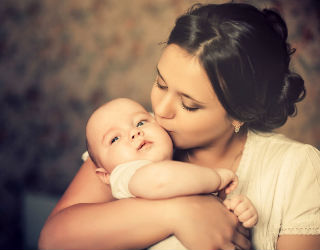We ask you, humbly: don't scroll away.
Hi readers, it seems you use Catholic Online a lot; that's great! It's a little awkward to ask, but we need your help. If you have already donated, we sincerely thank you. We're not salespeople, but we depend on donations averaging $14.76 and fewer than 1% of readers give. If you donate just $5.00, the price of your coffee, Catholic Online School could keep thriving. Thank you.Help Now >
The Wedding Invitation of Jesus: We are Called to Live the Nuptial Mystery
FREE Catholic Classes
It is not accidental that the Bible, from beginning to the end, uses marriage as a metaphor and a symbol to reveal the plan of God for the whole human race. Marriage was God's plan from the beginning as we see in the first book of Genesis. Throughout the Old Testament, the Lord speaks through His messengers to remind Israel that has espoused her Himself. Then, in the fullness of time, he sent the Bridegroom, Jesus, his only Son, to initiate the New Israel, the Church - through His saving Incarnation, life and redemptive death. At the cross he espoused Himself to the Church, which is now His Bride.
Highlights
Catholic Online (https://www.catholic.org)
10/13/2014 (9 years ago)
Published in Year of Faith
Keywords: wedding feast, marriage feast, marriage feast of the lamb, Book of revealtions, celibacy, Christian marriage, nuptial mystery, holiness, heaven, no marriage in heaven, happiness, Loving God, Deacon Keith Fournier
CHESAPEAKE, VA (Catholic Online) - Last year we received an invitation to the wedding of the oldest daughter of friends of many years. The invitation was beautiful, with a photo of the young couple, smiling and obviously filled with the anticipatory joy which accompanies such a monumental moment in life.
My wife and I were excited, for the young couple, and for our friends. We knew how much they love their dear daughter and how long they prayed for just the right man to court and then spend his life with her. Wedding invitations have a funny way of stripping away the accumulated emptiness of daily problems and silly worries.
Even anticipating the wedding helps us to focus on the very meaning of our lives, to give and receive love. It seems to touch something deep within us, at the core of our very identity. The wedding ceremony itself does so much more. We cry at weddings precisely because we are confronted with the meaning of life and the very structure of reality.
At this point some of you are probably thinking "I thought it was because the bride is always so beautiful." Yes, that is true, but why? Weddings point us toward the purpose of our lives and invite us to step into the plan of the God who is Love, and has called us to live our lives in love, beginning now and stretching into eternity. That is part of the reason we so often cry at weddings. They touch us at the core of our being.
For the Christian, every day is an invitation into what, in theological terms, we call the nuptial mystery. The word nuptial means of or related to marriage or weddings, even in the plain language dictionaries. The catechism of the Catholic Church, in its treatment of the Sacraments at the Service of Communion at chapter seven (See, CCC #1601 - 1666) expounds the biblical and longstanding teaching on marriage and the plan of God.
One simple line drives the point home: The nuptial covenant between God and his people Israel had prepared the way for the new and everlasting covenant in which the Son of God, by becoming incarnate and giving his life, has united to himself in a certain way all mankind saved by him, thus preparing for "the wedding-feast of the Lamb". (CCC# 1612, citing Rev. 19:7,9) Every time we participate in the Eucharistic Liturgy, we touch the great mystery. We participate in the wedding feast of eternity, beginning right now. heaven comes to earth and earth touches heaven.
We ask you, humbly: don't scroll away.
Hi readers, it seems you use Catholic Online a lot; that's great! It's a little awkward to ask, but we need your help. If you have already donated, we sincerely thank you. We're not salespeople, but we depend on donations averaging $14.76 and fewer than 1% of readers give. If you donate just $5.00, the price of your coffee, Catholic Online School could keep thriving. Thank you.Help Now >
In our Gospel passage today (Mt. 22:1-14) Jesus uses a parable to once again speak into our hearts. In the biblical language, the heart is not simply the organ at the center of our chest but that place deep within where we make our most fundamental choices about life. He tells us that the "Kingdom of heaven may be likened to a king who gave a wedding feast for his son."
"He dispatched his servants to summon the invited guests to the feast, but they refused to come. A second time he sent other servants, saying, 'Tell those invited: "Behold, I have prepared my banquet, my calves and fattened cattle are killed, and everything is ready; come to the feast."
It is not accidental that the Bible, from beginning to the end, uses marriage as a metaphor and a symbol to reveal the plan of God for the whole human race. Marriage was God's plan from the beginning as we see in the first book of Genesis. Throughout the Old Testament, the Lord speaks through His messengers to remind Israel that has espoused her Himself.
Then, in the fullness of time, he sent the Bridegroom, Jesus, his only Son, to initiate the New Israel, the Church - through His saving Incarnation, life and redemptive death. At the cross he espoused Himself to the Church, which is now His Bride. The wedding language informs the entirety of the New Testament culminating with the Wedding Feast of the Lamb which opens the portal of the mystery to reveal God's plan fulfilled in eternity.
This is the mystery to which the Apostle Paul so often points in his letters to the early churches. At the end of his profoundly important instructions about marriage to the early Church (Ephesians 5) he opens the mystery up with this line, "This is a profound mystery-but I am talking about Christ and the church." (Eph. 5:32)
There will be no giving or taking in marriage in the kingdom to come because the very purpose and meaning of marriage itself will be fulfilled. (See, e.g. Mk. 12:18-27) We will be living in the fullness of the Communion of Love with the Trinity. The symbol will give way to the eternal reality, the Sacrament will be fulfilled in the fullness of communion. All of human love will be completed in the Love which lasts forever.
Both Christian marriage, consecrated to the Lord in a sacramental bond, and consecrated celibacy for the sake of the kingdom to come, participate in the one nuptial mystery. Christian marriage participates in a mediated way, through a husband or a wife. That is why the witness of Christian marriage is so vital. Celibacy participates in an immediate and prophetic way - forsaking an earthly spouse to stand in this world as a symbol of the life to come. The consecrated celibate is married already to the bride, Christ's Church, and is free to minister accordingly, revealing the mystery for all in a prophetic sign.
However, both Christian marriage and consecrated Christian celibacy participate in the one nuptial mystery and both lead us into communion with the Lord. They also position us for mission. In that context, the response of the invited set forth in our Gospel passage becomes clearer. It is also so very saddening,
"Some ignored the invitation and went away, one to his farm, another to his business. The rest laid hold of his servants, mistreated them, and killed them. The king was enraged and sent his troops, destroyed those murderers, and burned their city. Then the king said to his servants, 'The feast is ready, but those who were invited were not worthy to come. Go out, therefore, into the main roads and invite to the feast whomever you find.' The servants went out into the streets and gathered all they found, bad and good alike, and the hall was filled with guests."
We have all been invited to the Wedding Feast of the Lamb. (Rev. 19) How are we living our lives in response? Has this fundamental truth about the very meaning and purpose of life and the root of our vocation truly informed the way we live every day? Are we preparing ourselves for the eternal wedding day? It is in this context that the final lines of this parable should be so sobering and motivating,
"But when the king came in to meet the guests he saw a man there not dressed in a wedding garment. He said to him, 'My friend how is it that you came in here without a wedding garment?' But he was reduced to silence. Then the king said to his attendants, 'Bind his hands and feet, and cast him into the darkness outside, where there will be wailing and grinding of teeth.' Many are invited, but few are chosen."
The image of clothing ourselves is used throughout the Bible. One example out of many will suffice, St Paul writes in his letter to the Colossians "Put on then, as God's chosen ones, holy and beloved, compassion, kindness, lowliness, meekness, and patience" (Col. 3:12). The Greek word translated "put on" is literally to clothe oneself. The wedding garment imagery refers to our cooperation with grace to grow in holiness in this life, in order to be effective as a servant of the Lord and to be properly dressed for the life to come.
 Hi readers, it seems you use Catholic Online a lot; that's great! It's a little awkward to ask, but we need your help. If you have already donated, we sincerely thank you. We're not salespeople, but we depend on donations averaging $14.76 and fewer than 1% of readers give. If you donate just $5.00, the price of your coffee, Catholic Online School could keep thriving. Thank you. Help Now >
Hi readers, it seems you use Catholic Online a lot; that's great! It's a little awkward to ask, but we need your help. If you have already donated, we sincerely thank you. We're not salespeople, but we depend on donations averaging $14.76 and fewer than 1% of readers give. If you donate just $5.00, the price of your coffee, Catholic Online School could keep thriving. Thank you. Help Now >
Let us decide today to respond to the Wedding Invitation and begin to live the Nuptial Mystery - right now. We can do so, by living our lives in, with, and for the Lord Jesus Christ. ----
Deacon Keith Fournier is Founder and Chairman of Common Good Foundation and Common Good Alliance. A married Roman Catholic Deacon of the Diocese of Richmond, Virginia, he and his wife Laurine have five grown children and six grandchildren, He serves as the Director of Adult Faith Formation at St. Stephen, Martyr Parish in Chesapeake, VA. He is also a human rights lawyer and public policy advocate.
---
'Help Give every Student and Teacher FREE resources for a world-class Moral Catholic Education'
Copyright 2021 - Distributed by Catholic Online
Join the Movement
When you sign up below, you don't just join an email list - you're joining an entire movement for Free world class Catholic education.
-

-
Mysteries of the Rosary
-
St. Faustina Kowalska
-
Litany of the Blessed Virgin Mary
-
Saint of the Day for Wednesday, Oct 4th, 2023
-
Popular Saints
-
St. Francis of Assisi
-
Bible
-
Female / Women Saints
-
7 Morning Prayers you need to get your day started with God
-
Litany of the Blessed Virgin Mary
Encouraging Scripture for the Single Mom on Mother's Day
-

New York Judge Halts Constitutional Amendment on Abortion Due to Procedural Flaws
-

Special Ways to Celebrate Mom This Mother's Day
-
Discalced Carmelites ask for Edith Stein to be declared 'Doctor of Truth'
-
Cinco de Mayo - What is the day really about?
Daily Catholic
 Daily Readings for Thursday, May 09, 2024
Daily Readings for Thursday, May 09, 2024 St. Pachomius: Saint of the Day for Thursday, May 09, 2024
St. Pachomius: Saint of the Day for Thursday, May 09, 2024 Prayer for Travelers: Prayer of the Day for Thursday, May 09, 2024
Prayer for Travelers: Prayer of the Day for Thursday, May 09, 2024- Daily Readings for Wednesday, May 08, 2024
- St. Peter of Tarantaise: Saint of the Day for Wednesday, May 08, 2024
- St. Augustine's Prayer to the Holy Spirit: Prayer of the Day for Wednesday, May 08, 2024
We ask you, humbly: don't scroll away.
Hi readers, it seems you use Catholic Online a lot; that's great! It's a little awkward to ask, but we need your help. If you have already donated, we sincerely thank you. We're not salespeople, but we depend on donations averaging $14.76 and fewer than 1% of readers give. If you donate just $5.00, the price of your coffee, Catholic Online School could keep thriving. Thank you.Help Now >
![]()
Copyright 2024 Catholic Online. All materials contained on this site, whether written, audible or visual are the exclusive property of Catholic Online and are protected under U.S. and International copyright laws, © Copyright 2024 Catholic Online. Any unauthorized use, without prior written consent of Catholic Online is strictly forbidden and prohibited.
Catholic Online is a Project of Your Catholic Voice Foundation, a Not-for-Profit Corporation. Your Catholic Voice Foundation has been granted a recognition of tax exemption under Section 501(c)(3) of the Internal Revenue Code. Federal Tax Identification Number: 81-0596847. Your gift is tax-deductible as allowed by law.










 Daily Readings for Thursday, May 09, 2024
Daily Readings for Thursday, May 09, 2024 St. Pachomius: Saint of the Day for Thursday, May 09, 2024
St. Pachomius: Saint of the Day for Thursday, May 09, 2024 Prayer for Travelers: Prayer of the Day for Thursday, May 09, 2024
Prayer for Travelers: Prayer of the Day for Thursday, May 09, 2024
